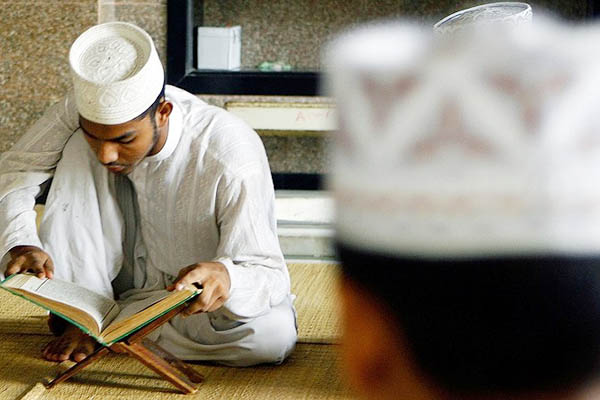
A student studies the Quran at the Darul Uloom Hanfia Razvia madrassa. Sajjad Hussain—AFP
In Pakistan, the rise of I.S. is bolstered by the group’s deep pockets and manpower from unregistered madrassas.
The spurt of terrorist attacks on innocent Pakistanis in the past week has prompted many to wonder who could fund such widespread horror in all four provinces, making the country look like a sitting duck. The Pakistan Army has hit back by killing “over 100” terrorists whose whereabouts it apparently already knew. It reeks of desperation, because Pakistan has been unable to hang killers condemned to death by its specially established military courts: only 15 out of 149 in two years.
The wonderment about funding is rooted in the firm Pakistani belief that big money could only come from the country’s enemies—depending on ideology, either India or the United States—bent upon destabilizing and humbling Pakistan. However, the fact is that funding is no problem at all either for Islamic State or Al Qaeda. The top American military commander in Afghanistan, General John Nicholson, recently claimed that entire tribal agencies—in this case Orakzai—in Pakistan have defected to I.S. because of its ability to fund their efforts. The following quote will give us an idea of what kind of money is involved.
According to a 2014 Thomson Reuters study, I.S. used to have more than $2 trillion in assets under its control in Iraq and Syria, with an annual income of $2.9 billion. It taxes everything that moves in its territory: “This includes an $800-per-truck levy on vehicles entering Iraq from Jordan and Syria, a 5 percent tax for social welfare and salaries, a $200 road tax on drivers in northern Iraq, a 50 percent tax for the ability to loot Raqqa’s archaeological sites, and a 20 percent tax at similar sites in Aleppo. Additionally, non-Muslims must pay a religious protection fee known as jizya.”
While international efforts have significantly reduced I.S.’s funding and occupied territory in Iraq and Syria in the years since, the group does not need too much money to attract the impoverished in Pakistan. Here, terrorists reportedly earn $400 a month and every child suicide-bomber’s family is compensated for his “sacrifice.” More so than money, what seems to matter is how I.S.’s message resonates with thousands of unregistered madrassas—including those in Islamabad—who supply the militant group with warriors from within their ranks.
